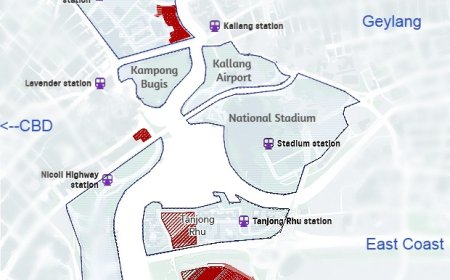Property Agents’ Conflicts of Interest in Singapore
Learn how property agents’ conflicts of interest can impact real estate transactions in Singapore. Understand disclosure requirements, client responsibilities, and tips to ensure transparent and fair property dealings.

When engaging a property agent to buy, sell, or rent a property, clients typically expect impartial advice. However, situations can arise where a property agent’s personal or professional interests may conflict with those of their client. Understanding how conflicts of interest occur, agents’ duties, and clients’ responsibilities is essential for a transparent and fair transaction.
What Is a Conflict of Interest?
A conflict of interest occurs when a property agent’s personal or professional interests differ from the client’s interests. This can compromise the agent’s ability to provide objective guidance. The Council for Estate Agencies (CEA) requires all agents to avoid potential conflicts of interest and to disclose them in writing if any arise.
Example: If a property agent receives incentives from a renovation company they recommend to you, this could influence their advice, even unintentionally.
Common Scenarios of Property Agent Conflicts
Conflicts of interest may arise in the following situations:
-
Personal or professional connections with the other party
-
The agent is a family member, business associate, or friend of the other party or their agent.
-
The agent works for the same property agency as the other party’s agent.
-
-
Financial incentives from third parties
-
Receiving referral fees from companies recommended to clients, such as banks, renovation firms, or legal services.
-
Collecting co-broke commissions from the other party’s agent without the client paying the agent directly.
-
-
Dual representation (illegal in Singapore)
-
Acting for both the buyer and seller in the same transaction.
-
Collecting multiple fees or commissions for representing multiple parties in one deal.
-
-
Receiving informal benefits
-
Accepting gifts, “angbao,” or other benefits from the other party who has not engaged an agent but requests assistance.
-
Key Insight: Dual representation is strictly prohibited. An agent cannot represent both sides of a transaction, as it creates an inherent conflict in financial and strategic interests.
When Must Agents Disclose Conflicts?
Agents are required to disclose conflicts or potential conflicts:
-
Before appointment: Disclosure must be provided in writing, including email, letter, or text messages (SMS/WhatsApp).
-
During a transaction: If a new conflict arises midway, agents must notify clients immediately in writing.
-
Client consent: Clients must provide written approval for the agent to continue representing them despite the conflict.
Example: If an agent becomes aware that they are personally connected to the buyer after a transaction has started, they must provide written disclosure and seek client consent to continue.
What Should a Written Disclosure Include?
A written disclosure should clearly explain:
-
The nature of the conflict
-
How it could affect the agent’s professional relationship and the transaction outcome
-
Any potential impact on the final property price or other financial terms
Pro Tip: Review the written disclosure carefully. Your consent may be legally binding. If uncertain, consider seeking legal advice.
Real-World Example: Selling an HDB Flat
If an agent is interested in buying your HDB flat, this represents a direct conflict of interest. As a seller, your goal is the highest price, whereas the agent, acting as buyer, seeks the lowest price. In such cases, the agent can only represent themselves and cannot collect commissions or co-broke fees from the other party.
Benefits of Understanding Conflicts of Interest
Being aware of potential conflicts ensures:
-
Transparent and fair transactions
-
Protection of financial interests
-
Reduced risk of disputes or legal complications
-
Informed decision-making when selecting an agent
Example: Knowing that an agent has a referral arrangement with a renovation company allows clients to evaluate whether the recommendation is in their best interest.
Best Practices for Clients
To ensure smooth property transactions:
-
Provide accurate and current information to your agent.
-
Ask for written disclosure of any potential conflicts.
-
Review disclosure carefully and give written consent if agreeing to continue.
-
Seek legal advice when unsure about conflict implications.
-
Maintain open communication with your agent throughout the process.
FAQs: Property Agent Conflicts of Interest
-
What is a conflict of interest in property transactions?
A situation where the agent’s personal or professional interests differ from the client’s, potentially compromising impartial advice. -
Are agents allowed to represent both buyer and seller?
No, dual representation is illegal in Singapore. An agent cannot collect fees from both sides. -
When must an agent disclose conflicts?
Before appointment and immediately if new conflicts arise during a transaction. -
Does verbal disclosure suffice?
No, disclosure must be in writing (letter, email, or text). -
Can I still work with an agent who has a conflict?
Yes, but you must provide written consent acknowledging the conflict. -
What should be included in a written disclosure?
The nature of the conflict, its potential impact on the agent-client relationship, and possible effects on the property price. -
Are referral fees considered a conflict?
Yes, receiving incentives from service providers recommended to clients constitutes a potential conflict. -
Can a family member of another party act as my agent?
This is a conflict of interest and must be disclosed before the agent represents you. -
What happens if a conflict arises midway through a transaction?
The agent must notify you in writing, and you must give written consent to continue. -
Should I seek legal advice regarding conflict disclosures?
Yes, especially if the written disclosure is complex or could impact the final transaction. -
Can agents accept gifts from other parties?
Accepting gifts or benefits that could influence the agent’s judgment constitutes a conflict and is prohibited. -
How do conflicts affect property pricing?
Conflicts may bias recommendations, potentially lowering or inflating the property price to benefit the agent or another party.
Algene Toh
Disclaimer: The information presented on BSR2.com is intended for general informational purposes only. It does not constitute legal, financial, investment, or real estate advice and should not be relied upon as such. While every effort has been made to ensure the accuracy, reliability, and completeness of the content at the time of publication, all data is derived from publicly available sources and may be subject to change without notice. BSR2.com makes no representations or warranties of any kind, express or implied, regarding the suitability, timeliness, or accuracy of the information provided for any specific purpose. Users are strongly encouraged to seek independent advice from qualified professionals before making any decisions based on the content found on this website. BSR2.com shall not be held liable for any loss, damage, or consequence, whether direct or indirect, arising from the use of or reliance on the information provided. The content is intended as a general guide and does not take into account individual circumstances.
What's Your Reaction?
 Like
0
Like
0
 Dislike
0
Dislike
0
 Love
0
Love
0
 Funny
0
Funny
0
 Angry
0
Angry
0
 Sad
0
Sad
0
 Wow
0
Wow
0










































